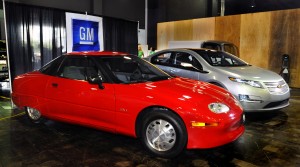
GM pulled the plug on EV1 in 1999 after fewer than 2300 were leased at Saturn dealers since 1996.
The Michigan Congressional delegation is moving to lock up government money for building electric cars. Both Democrats and Republicans have joined together in pressing the U.S. Department of Energy for a large share of the $2 billion the DOE is preparing to distribute to support development of advanced batteries, electric motors and the electronic systems.
The Obama Administration and the green movement are claiming that electric cars will ultimately create jobs in the ailing auto sector as unemployment across the country continues to rise to record post war levels. This political talking point, repeated over and over again, is thus far a political promise that is not backed up by any data.
In a letter signed by all 17 members, the Michigan delegation asked U.S. Energy Secretary Steven Chu for special consideration.
“We are writing to express our united support for the full consideration of the applications submitted to the Department of Energy by some of the most innovative and knowledgeable firms, collaborations and individuals from Michigan, which is home to an unparalleled expertise and experience in deploying large-scale new manufacturing technologies,” the letter said.
“The American Recovery and Reinvestment Act” included $2 billion for grants for manufacturing of advanced batteries, electric motors and related electronics for electric vehicles. The stated purpose of this funding is to invest in vital home-grown technologies and job creation in a new industry. The electric vehicle industry needs the development of a U.S. manufacturing base for batteries, and to “accelerate development and commercialization of reliable, safe and affordable electric drive vehicle systems,” the letter said.
State officials, with help from automakers who missed the hybrid revolution, have made a concerted push to make the state a center for the battery technology that is expected to drive electric vehicles. Advanced battery development is currently dominated by Asian firms and supported by their governments. Even GM, the company that first brought a modern electric vehicle to the mass market, in 1996, EV1, and then killed the project for lack of interest, will buy Korean-made batteries for its next foray into electric vehicles, the Chevrolet Volt that is due late next year.
Four companies announced plans last month to invest more than $1.7 billion to launch advanced battery manufacturing in Michigan, the letter noted. Part of the investment hinges on the approval of DOE grants. Previous Federal attempts to spur advanced car developments with research money, notably the Partnership for a New Generation of Vehicles, never produced the 80 mpg car promised after billions of dollars of taxpayer subsidies.
Johnson Controls-Saft Advanced Power Solutions has teamed up with the Ford Motor, while LG Chem-Compact Power of Troy has teamed with General Motors to produce the advanced batteries. A123 Systems has teamed up with Chrysler. Only last week, DTE Energy agreed to join General Electric in investing $69 million in A123, while a fourth consortium, including KD Advanced Battery Group, is a joint-venture between Dow Chemical of Midland, Kokam America Inc. and Townsend Ventures,
“Michigan is uniquely prepared to offer an American-led solution that meets these important goals,” the letter claimed.
“While Michigan’s auto industry is facing historic challenges, this is also a time of unprecedented opportunity for our highly skilled workers to take a leadership role in meeting critical national needs. Nine of the world’s top original equipment manufacturers (OEMs) and 46 of top 50 global suppliers have significant investments in our state, much of those now focused on developing zero or near-zero emission vehicles of the future. Our skilled workforce will also bring unmatched technical expertise that will give Michigan battery manufacturers a significant advantage over their competitors,” the letter noted.
“To support these manufacturers in their efforts, our state government colleagues, on a bipartisan basis, have taken aggressive action to organize our considerable research, development and manufacturing assets, including passage of unmatched state-level incentives to further leverage federal advanced energy investments,” the letter said.
The State of Michigan is currently running a huge deficit, and will only balance its budget this year because of almost one billion dollars in federal taxpayer handouts. Michigan legislators have refused to cut their salaries or make other personal cost cutting concessions to help beleaguered Michigan workers and taxpayers.
The state incentives referred to include $700 million in state tax credits for battery pack manufacturing, research and development, engineering and construction of production-scale battery grants.
The drive to build a battery-powered state economy took on added urgency this week when President Barack Obama unveiled new federal fuel economy standards to 35 miles per gallon by 2016, which will force more efficient vehicles on the market.
Both automakers and federal officials have said the expanded use of electric vehicles and hybrids will be required to meet the standards, as will the import of large numbers of small vehicles from low wage countries with protected auto markets. The United Auto Workers Union has publicly protested GM’s revitalization plan that relies heavily on Korean, Chinese and Mexican imports with the support of the U.S. Treasury Department. Chrysler will eventually be under Italian-based Fiat control as a result of the Treasury approved reorganization.
Ken Zino reported on this story.

When you say that GM killed the EV1 due to lack of interest, you should be more specific. It wasn’t the public’s lack of interest, it was GM management’s. For example, they only offered a very limited number of the things for lease in two states. Like the Saturn division itself, GM has had a tendency to foster good ideas and then kill them off or let them die due to neglect or corporate infighting.